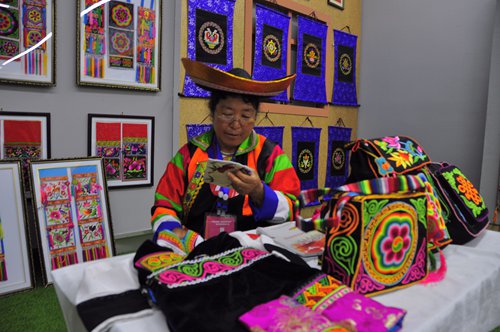
A woman does stitchwork in a 1.5-hour embroidery contest in Xining, Northwest China's Qinghai Province on July 12, 2018. (Photo: IC)
Provincial-level working rules on promoting ethnic unity in Northwest China's Qinghai Province, which emphasize protection of unique culture and freedom of marriage, have been hailed by experts as improving ethnic integration and prosperity for all ethnic groups.
People are banned from engaging in actions that affect national policy or hinder social order, or interfere with others' freedom of marriage in the name of religious belief, according to a news conference on Sunday in Xining, capital of Qinghai, where the rule was officially released.
Spreading comments, collecting or producing information that is bad for ethnic unity or advocating religious extremism and sabotaging ethnic unity, inciting national separatism and damaging national security are not allowed, the Rule to Promote Ethnic Unity and Progress of Qinghai Province reads.
Violators of these articles may face criminal punishment, according to the rule.
The rule, which contains 36 articles and covers a wide range of topics, will take effect on May 1.
Qinghai Province is now home to 55 ethnic groups and has the second-largest Tibetan population outside the Tibet Autonomous Region. Ethnic minorities account for 47.7 percent of the entire population, China National Radio reported on Sunday.
Xiong Kunxin, a professor of ethnic studies at Minzu University of China in Beijing, said such a rule would improve ethnic unity and integration in the region where ethnic minority populations are concentrated, and the concrete articles would guide future work.
In Qinghai, progress in ethnic unity and ethnic integration will lead to regional stability and development, Xiong told the Global Times on Monday.
The rule also stipulates that different cities and counties in Qinghai should develop a unique industry or cultural tourism to boost the local economy and improve the livelihood of all ethnic groups.
Traditional festivals, arts and sports should be protected. People of different ethnic groups are encouraged to participate in the cultural activities of other groups.
Services for migrant workers, and employment, their children's education and legal assistance should be strengthened. A system should be built to share information to support migrant workers.
Qinghai is not the first province to pass such a rule. Southwest China's Guizhou Province and Northwest China's XinjiangUyghur Autonomous Region implemented similar rules in 2015 and 2016 respectively.
Different provinces and regions have different emphases on ethnic unity work, Xiong said, noting that relations between Han people and Tibetans are the key point for Qinghai.
All three provinces and regions put an emphasis on poverty alleviation and economic development in their rules, which "will improve the harmony and prosperity of all ethnic groups," Xiong said.


